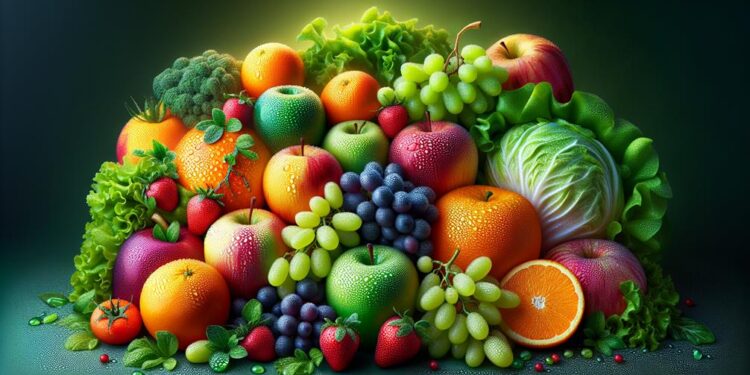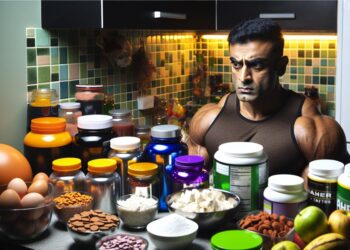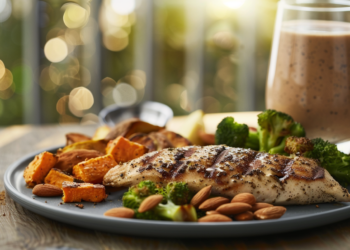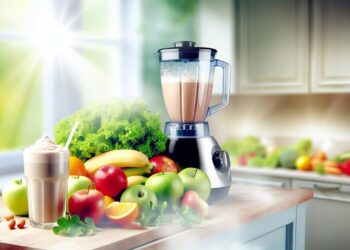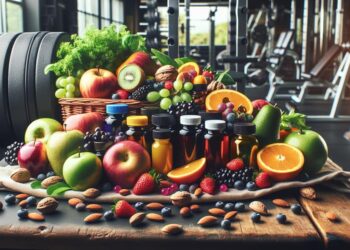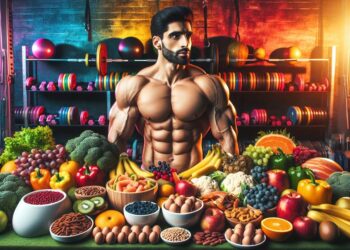Did you know that staying well-hydrated goes beyond simply drinking enough water? While most people are aware of the importance of hydration, there are nutrition tips and hacks that can take your hydration game to the next level. From optimal water intake to hydrating foods and beverages, there is a whole world of strategies waiting to be explored. So, if you're ready to unlock the secrets to staying well-hydrated and optimize your overall health, keep reading to discover essential nutrition tips and hydration hacks that will leave you feeling refreshed and revitalized.
Key Takeaways
- Proper hydration is important for supporting bodily functions, improving skin health, and reducing signs of aging.
- Water requirements vary based on factors like body weight, activity level, and climate.
- Hydrating foods and beverages, such as watermelon, cucumber-infused water, and coconut water, provide additional nutrients for overall health.
- Hydration is crucial for optimal performance during physical activity, preventing muscle cramps and fatigue, and supporting cognitive function, digestion, and energy levels in everyday life.
Importance of Hydration
Staying hydrated is crucial for maintaining optimal health and well-being. Proper hydration plays a vital role in supporting various bodily functions. One of the benefits of hydration is its impact on the skin. When you are adequately hydrated, your skin becomes more supple, radiant, and less prone to dryness and wrinkles. Water helps to moisturize your skin from within, promoting a healthy complexion and reducing the signs of aging.
On the other hand, dehydration can lead to several common signs in the body. Feeling thirsty is an obvious indicator that you need to drink more water. However, there are other less noticeable signs as well. For instance, dry mouth, dark-colored urine, and infrequent urination are all signs that your body is not getting enough fluids. Dehydration can also cause fatigue, dizziness, and headaches.
To ensure proper hydration, it is recommended to drink at least eight glasses of water per day. However, individual needs may vary depending on factors such as age, activity level, and climate. Remember to drink water throughout the day, even if you don't feel thirsty. By maintaining proper hydration, you can support your overall health and enjoy the benefits of glowing, healthy skin.
Optimal Water Intake
To maintain optimal hydration, it is important to determine the optimal water intake for your individual needs. Water requirements can vary based on factors such as body weight, activity level, and climate. Hydration levels can be influenced by various factors, including sweat loss, urine output, and overall fluid balance.
To help you understand your water requirements, consider the following table:
| Factors | Water Requirements |
|---|---|
| Body weight | 30-35 mL/kg/day |
| Activity level | +500-1000 mL/day |
| Climate | +500-1000 mL/day |
By taking these factors into account, you can estimate your daily water intake needs. For example, if you weigh 70 kilograms, engage in moderate activity, and live in a hot climate, your estimated water intake would be around 2,550-2,800 mL/day. Keep in mind that this is just an estimate, and individual variations may occur.
It is important to note that the table provided is a general guideline and may not apply to everyone. Individuals with certain medical conditions or who engage in intense physical activity may require higher water intake. Additionally, listen to your body's signals of thirst and aim to drink water throughout the day to maintain proper hydration levels.
Hydrating Foods and Beverages
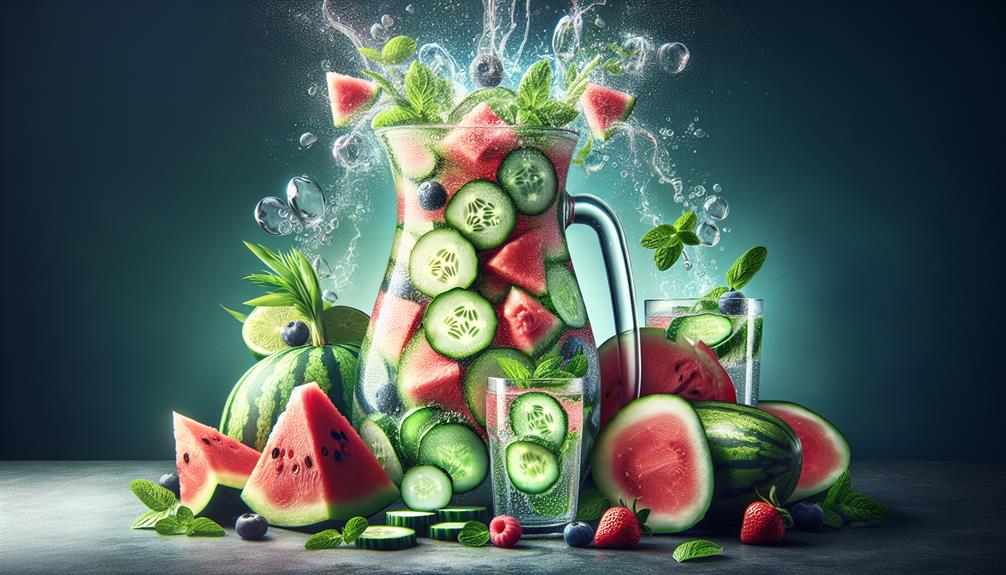
Including hydrating foods and beverages in your diet can be a great way to support your body's hydration needs. Not only do these options provide a refreshing way to stay hydrated, but they also offer additional nutrients that are beneficial for overall health. Here are three hydrating snacks and drinks that you can incorporate into your diet:
- Watermelon: With its high water content (about 92%), watermelon is a delicious and hydrating snack option. It also contains essential vitamins, minerals, and antioxidants that can help support your immune system and overall well-being.
- Cucumber-infused water: Infusing water with cucumber slices adds a refreshing twist to your hydration routine. Cucumbers are composed of about 96% water and are a great source of electrolytes, such as potassium and magnesium, which are essential for maintaining proper hydration.
- Coconut water: Coconut water is a natural and electrolyte-rich beverage that can help replenish fluids and minerals lost through sweat. It also contains potassium, magnesium, and calcium, which are important for proper muscle function and hydration.
Hydration for Physical Activity
Proper hydration is crucial for optimal performance during physical activity. When you engage in workouts, your body loses water through sweat, and if you don't replenish it, you can become dehydrated. Hydration during workouts not only helps maintain your body's fluid balance but also provides several other benefits.
Drinking water during exercise helps regulate your body temperature, allowing you to stay cool and prevent overheating. This is particularly important in intense or prolonged workouts when your body generates more heat. Adequate hydration also supports your cardiovascular system, ensuring that your heart can efficiently pump oxygen-rich blood to your muscles. This enhances your endurance and overall performance during physical activity.
Additionally, staying well-hydrated during workouts can prevent muscle cramps and fatigue. Dehydration can lead to electrolyte imbalances, which affect muscle function and can result in painful cramps. By replenishing your fluids, you can maintain the right balance of electrolytes and keep your muscles functioning optimally.
To ensure proper hydration during exercise, it is recommended to drink water before, during, and after your workouts. Aim to consume about 17-20 ounces of water two to three hours before your session, and then continue drinking small amounts every 15-20 minutes during your workout. After exercising, drink another 8 ounces of water to replenish the fluids you lost.
Hydration Habits for Everyday Life

Maintaining proper hydration goes beyond just physical activity – it is essential for your everyday life as well. Hydration routines play a crucial role in ensuring your overall well-being, including your cognitive function, digestion, and energy levels. Here are three key tips to help you stay hydrated throughout your workday:
- Keep a water bottle within reach: Make it a habit to always have a water bottle on your desk or in your bag. This constant visual reminder will encourage you to sip on water regularly throughout the day.
- Set hydration goals: Aim to drink a certain amount of water by specific times during the day. For example, you can set a goal to finish a full glass of water before your lunch break and another before heading home. This simple strategy helps you stay on track and ensures you meet your daily hydration needs.
- Opt for hydrating snacks: Incorporate hydrating foods into your daily snacks. Fresh fruits like watermelon, oranges, and strawberries are not only delicious but also high in water content. Additionally, vegetables like cucumbers and celery are excellent choices for hydration.
Frequently Asked Questions
Can Certain Medical Conditions Affect Our Body's Hydration Levels?
Certain medical conditions can affect your body's hydration levels. For example, conditions like diabetes or kidney disease can make it harder for your body to retain water, leading to dehydration. Additionally, certain medications can also impact your body's hydration levels.
Are There Any Specific Foods That Can Help With Hydration?
Certain foods can help with hydration. Incorporating water-rich fruits and vegetables like watermelon, cucumbers, and oranges into your diet can provide an additional source of hydration. Stay hydrated by choosing the right foods.
How Does Dehydration Affect Our Mental and Cognitive Functions?
Dehydration can negatively impact your mental and cognitive functions. It can lead to decreased focus, impaired memory, and slower reaction times. Maintaining proper hydration and electrolyte balance is crucial for optimal physical and mental performance.
Can Drinking Excessive Amounts of Water Be Harmful to Our Health?
Drinking excessive amounts of water can have potential risks to your health. It's important to understand the recommended water intake for your body and avoid overhydration, which can lead to electrolyte imbalances and water intoxication.
What Are Some Signs and Symptoms of Dehydration That We Should Look Out For?
If you're wondering about signs and symptoms of dehydration, it's important to know that things like dry mouth, fatigue, and dark urine can indicate a lack of proper hydration. Medical conditions can also affect hydration levels.
Conclusion
So there you have it, the ultimate hydration hacks to keep you feeling refreshed and energized. By understanding the importance of hydration and knowing your optimal water intake, you can ensure your body gets the nourishment it needs. Incorporating hydrating foods and beverages into your diet and staying mindful of hydration during physical activity will further support your overall well-being. Remember, staying hydrated is not just a habit, it is a lifestyle choice that can have a profound impact on your health. Stay hydrated and stay healthy!


